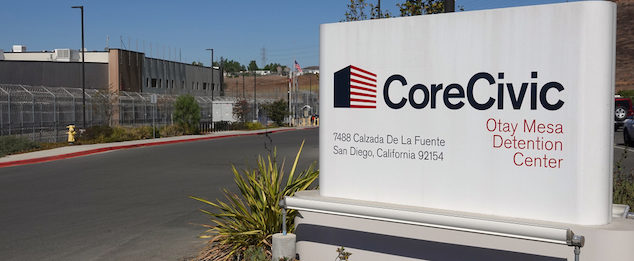Opinion
Stop COVID-19 spread in private detention facilities
 The entrance to a private detention facility in Otay Mesa in San Diego County. (Photo: Simone Hogan, via Shutterstock)
The entrance to a private detention facility in Otay Mesa in San Diego County. (Photo: Simone Hogan, via Shutterstock)The COVID-19 pandemic has laid bare numerous issues related to health, equity and justice in our state. One of the most dire circumstances highlighted by the pandemic are the deadly conditions faced by those in immigrant detention facilities in California.
Though seven of the eight immigration detention facilities in the state are operated by for-profit companies, California must take steps to clarify the rules and regulations that govern the conduct of private operators.
Although the facilities are under contract with ICE and are legally obligated to follow specific guidelines and standards, disturbing reports paint a very different picture.
In 2020, California held the grim distinction of being home to the largest outbreak of COVID-19 in any ICE detention facility in the nation, when more than one hundred detainees were diagnosed with COVID-19 at the Otay Mesa Detention facility, operated by the for-profit company CoreCivic.
Tragically, that facility was also the scene of the first COVID-19 death in immigrant detention nationwide when Carlos Ernesto Escobar Mejia died in May of 2020.
The circumstances in Otay Mesa are emblematic of the problems posed by these facilities.
Although the facilities are under contract with Immigration and Customs Enforcement (ICE), and are legally obligated to follow specific guidelines and standards, disturbing reports paint a very different picture. During the outset of the pandemic, it was reported that CoreCivic attempted to coerce detainees to sign legal waivers before providing them with PPE, and allegedly used pepper-spray against detainees who protested.
Now a new legislative measure, AB 263, The Health Oversight and Leadership in Detention Act by Assemblymember Dr. Joaquin Arambula (D-Fresno) would clarify that these facilities must abide by California public health and worker safety laws. By providing much needed clarity on the matter and guidance to local and state officials, countless lives could be saved.
Private detention facilities also pose a threat to those they employ.
In April 2020, two detention officers sued CoreCivic alleging unsafe work conditions. Emails obtained by advocates from the San Diego Public Health Department also document correspondence between public health officials and the Warden of the for-profit facility in the spring of 2020. This includes emails from public health officials asking the Warden to test their employees after a massive COVID outbreak. The response from the Warden according to the emails was: “Doc – Just so we’re clear – at this point we have no intention to mass test our staff.”
It is not only the lives of detainees and employees that are in the balance, but the surrounding community as well. Not only can these facilities become vectors for transmission to the community, but recent studies have shown that outbreaks in detention can quickly overwhelm local hospitals and place a strain on medical resources, threatening public health.
That is why AB 263 is timely and necessary.
The bill makes it mandatory for private detention facilities to abide by all public health orders, and CAL/OSHA regulations for workers. It empowers local public health officers to take the lead on securing these facilities and ensures accountability when it comes to for-profit detention operators. The bill would send a clear message to private operators that they are not above the law, and prevent future outbreaks of COVID-19 in these facilities, and hopefully save lives in the process.
The eight immigrant detention facilities that stretch across the state have the capacity to hold more than 7,400 immigrants, with many times that number likely to cycle through these facilities in a given year.
The pandemic has been tragic, but it has also served as a learning lesson for leadership, governance and policy-making.
Ensuring that we have a plan in place to protect the lives of those in detention facilities as well as in the surrounding communities is not just prudent public policy, it is a moral imperative.
—
Editor’s Note: Adriana Sanchez–Ochoa is the deputy director of NextGen Policy, an advocacy organization. Jackie Gonzalez is the policy director of Immigrant Defense Advocates.
Want to see more stories like this? Sign up for The Roundup, the free daily newsletter about California politics from the editors of Capitol Weekly. Stay up to date on the news you need to know.
Sign up below, then look for a confirmation email in your inbox.

Leave a Reply